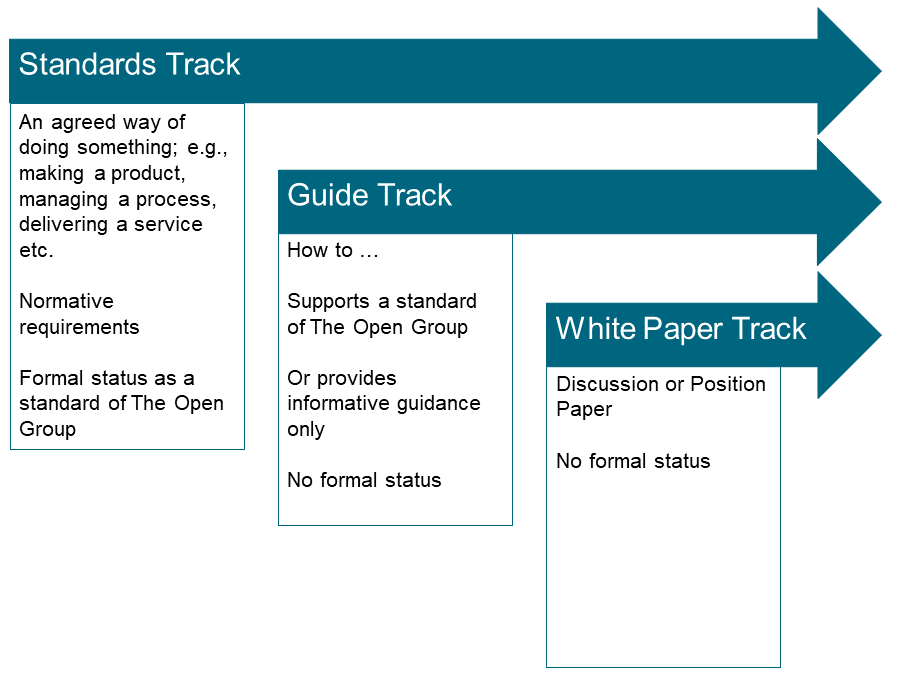1. Introduction
The work of The Open Group relies on cooperation between a broad cultural diversity of organizations, peoples, ideas, and communication styles.
This document provides guidance for individuals participating in The Open Group Forums and Work Groups as we work together to develop multiple standards towards the vision of Boundaryless Information Flow™.
This document supplements and defers to The Open Group standard governance procedures contained in The Open Group Standards Process. Information on The Open Group Standards Process is available at: www.opengroup.org/standardsprocess.
1.1. Publication Tracks
The main objective of a Forum/Work Group should be the development and evolution of relevant standards in its subject area; however, not all output is suitable for standardization, and a number of alternative publication tracks are available, as shown in Publication Tracks.

Common to each track is the requirement for a document to obtain approvals prior to publication in the following order:
-
Approval by the Vice-President responsible for the work area, and the Director of Standards
-
Approval by The Open Group Executive Management
A document containing normative requirements must be developed and approved through the Standards Process. This results in a formal status as a standard of The Open Group. The Standards Development Lifecycle is described in The Standards Development Lifecycle.
If the document contains supporting guidance to a standard, or provides informative guidance on a topic related to the functional area for the Forum/Work Group, then it should be developed and published as a Guide. A Guide has no formal status. The Guide process is described in The Guide Process.
If the document is a discussion or position paper to document current thinking in a subject area with a view to soliciting feedback and comment, then it should be published as a White Paper. A White Paper has no formal status. The White Paper process is described in The White Paper Process. White Papers should not be used as a path for documents intended to become standards; the Snapshot process should be used instead (see The Snapshot Process).
1.1.1. What is a Standard?
“A standard is an agreed way of doing something. It could be about making a product, managing a process, delivering a service, or supplying materials – standards can cover a huge range of activities undertaken by organizations and used by their customers.
Standards are the distilled wisdom of people with expertise in their subject matter and who know the needs of the organizations they represent – people such as manufacturers, sellers, buyers, customers, trade associations, users, or regulators. They are powerful tools that can help drive innovation and increase productivity. They can make organizations more successful and people’s everyday lives easier, safer, and healthier.”
—— Source: BSI
1.2. Guiding Principles for Forums and Work Groups
1.2.1. Principle #1: The Primacy of Principles
All Forum/Work Group decisions, and decision-making processes, will be based on principles that are agreed by, and openly accessible to, members of the Forum/Work Group.
1.2.2. Principle #2: We Inherit the Principles of The Open Group
We are committed to the achievement of The Open Group vision, mission, and to adhere to its principles:
-
Openness
-
Consensus
-
Public availability of published standards
-
No legal impediment to implementation or adoption
-
Confidentiality
-
Executable Standards
1.2.3. Principle #3: Collaboration
Everything we do is done through goodwill, trust, and collaboration:
-
The Forum/Work Group must be inviting, open to hearing everyone’s voice
-
We need to express rationale, not just positions
-
Decision-making is collaborative and informed
1.2.4. Principle #4: Shared Purpose
Our shared purpose is to advance a common standard:
-
Everyone has a business rationale for participation
-
Everyone has come here to make the industry better
-
Everyone shares the credit and the benefit
1.2.5. Principle #5: Formal Process
We follow formal processes for planning, operations, decision-making, and reaching consensus.
1.2.6. Principle #6: Obligations of Leadership
The higher up you are, the more you serve the Forum/Work Group and its members:
-
The obligation of the Chair and Vice-Chair is to facilitate the Forum/Work Group to pursue its agreed objectives, and to enable it to make its decisions balanced by consensus, fairness, and the voluntary nature of the organization
-
Although a Chair/Vice-Chair may often have special expertise in an area, they recognize that this is secondary to their obligations in the facilitation role and ensure that they are impartial and objective
1.2.7. Principle #7: Openness and Assumption of Good Intent
Seek to collaborate and understand:
-
By validating assumptions and inferences
-
By clarifying the meaning of special words used